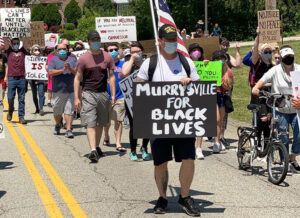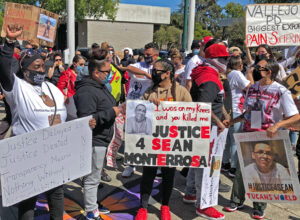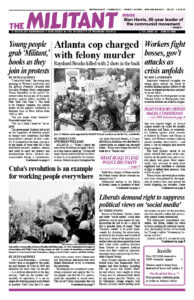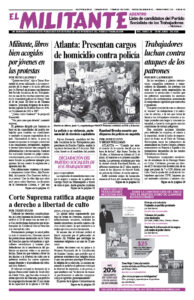ATLANTA — “When I heard the news about the killing last night, I decided it was time to stand up,” 18-year-old James Teasley told the Militant in Atlanta June 13, as he joined his first demonstration. Protests erupted throughout the city when Rayshard Brooks, a 27-year-old African American, was shot dead by Garrett Rolfe, an Atlanta cop, the night before. “If you want change you have to work for it,” Teasley said.
Rolfe faces charges of felony murder, the Fulton County district attorney announced June 17.

Widespread outrage at the killing of Brooks comes as hundreds of thousands of working people in cities, small towns and rural areas across the country and worldwide continue to protest cop brutality. The explosion began after four cops in Minneapolis killed George Floyd May 25, cuffing him and kneeling on his neck for over eight minutes while he repeatedly told them, “I can’t breathe.” Brooks was killed after he had fallen asleep in his car while waiting to pick up food at a Wendy’s drive-thru. He was planning to go to a birthday party for his daughter. The two cops, Rolfe and Devin Brosnan, rousted him, patted him down and administered an alcohol breath test, which they say Brooks failed. They then moved in to arrest him.
A struggle ensued with Brooks grabbing one of the officer’s Tasers and running away. The cops gave chase, firing a Taser at him. Brooks fires a Taser near Rolfe. Rolfe pulls out his gun and fires three shots, two of them hitting Brooks in the back, killing him. This led to an uproar of protests.
Within 24 hours Rolfe was fired, Brosnan placed on administrative leave and Atlanta Police Chief Erika Shields resigned. Brooks’ family members are calling for the officer who shot him to be arrested and charged for Brooks’ death.
Atlanta Police Department records show that Rolfe has faced multiple complaints for unauthorized use of force during his seven years as a cop.

Actions have taken place in at least 2,000 cities and towns across the country. They show the strength of the changes that have occurred in the working class as a result of the proletarian Black-led civil rights movement in the 1950s and ’60s that overthrew Jim Crow segregation and boosted the fight against racism around the world.
A series of actions are taking place nationwide on Juneteenth, the June 19 holiday that marks the day the last slaves in the U.S. were freed.
Today’s protests against cop brutality provide a powerful example of what workers and farmers can do when we organize around our common interests in the face of the bosses’ efforts to offload the capitalist crisis on our shoulders.
“We can’t live on our wages. We can’t afford a place to live, and it’s motivating a lot of people to come out to join the protests,” Sarah Scott, 30, told the Militant at an action against cop brutality in Seattle June 12. “It’s really inspiring.”
Protests spread in small towns
Many actions are being organized in smaller towns where protests have been rare in recent years. The vast majority of participants are Caucasian. Organizers — often area high school students — say they didn’t know what to expect and were surprised by how many people turned out. Each one spurred other calls to action in nearby villages.

In Pennsylvania, for example, protests have occurred in Jeannette, Monroeville, Butler, Murrysville, New Kensington, St. Marys, Reading, Hamburg, and Shippensburg, to name a few. In Irwin, a town of 3,700 people, students from Norwin High School organized a protest June 6. Several hundred joined in. This is the area that former President Barack Obama smeared as racist and reactionary at a San Francisco fundraiser in 2008. “You go into these small towns in Pennsylvania, and, like a lot of small towns in the Midwest, the jobs have been gone for 25 years and nothing replaced them,” Obama opined. “And it’s not surprising then they get bitter, they cling to guns or religion or antipathy toward people who aren’t like them or anti-immigrant sentiment or anti-trade sentiment as a way to explain their frustrations.”
In Butler, population 14,000, north of Pittsburgh, some 25 people turned out June 13. “I didn’t expect a protest to happen here, but I’m glad it did,” Aimee Kelly, a hairdresser, told the Militant at the action. Another Butler resident, Phil Heasley, added, “Police brutality is not just a big town issue.”
In Murrysville, Aryanna Hunter, a veteran of Washington’s 2003 war on Iraq, decided to initiate a similar action in her hometown.
“The number of folks turning out all across rural Pennsylvania is amazing,” she told the Pittsburgh Tribune. “If we’re going to change anything we also have to show our neighbors that Black lives matter. And I shouldn’t have to drive to Pittsburgh to do that.”
Several hundred people turned up, marching down the town’s main highway June 14.
“These small towns matter because it’s a lot of small towns,” Ande Green, one of two organizers of a protest in Alliance, Ohio — population 21,616 — told BuzzFeed News. “All of these small towns coming together, it’s what we need to make a change.”
Actions have taken place across all 50 states. In Alaska in early June rallies protesting the killing of Floyd were organized by Alaska Natives, who spoke out against harassment they face from the cops. Actions have been organized from Kotzebue above the Arctic Circle to Ketchikan in the southeastern part of the state.
The impact of these protests nationwide resulted in authorities charging officer Derek Chauvin with second-degree murder, and also filing charges against the three other cops who helped Chauvin kill Floyd.
‘Charge cops who kill’
Protests have continued in Atlanta since the cops killed Rayshard Brooks. Members of the Amalgamated Transit Union joined several thousand marching on the Georgia state Capitol June 15 called by the NAACP.
“Union workers have to show some leadership in the fight against police brutality and for justice,” Britt Dunams, president of ATU Local 732, told the Militant. “Each and every time there’s been a rally, we’ve been there.”
The nationwide actions boost the fight to charge the cops who killed Breonna Taylor in Louisville, Kentucky, March 13. Emergency room technician Taylor was killed when cops carried out a midnight no-knock raid on her apartment, spraying the bed where she slept with bullets. Charges have yet to be filed against the three officers who carried out the attack.
In Radcliff, Kentucky, more than 200 people rallied and marched June 13 in this town of 22,000 near the Fort Knox army base southwest of Louisville. Chloe Metcalf, a youth pastor at the Restoration Worship Center church, organized the protest. Speakers included Metcalf pastor Carl Smalls, Radcliff Mayor J.J. Duvall, Socialist Workers Party presidential candidate Alyson Kennedy and her running mate Malcolm Jarrett.
“These cops need to go to jail for what they did to Breonna,” Tamar Strong, who is laid-off from a job working with people with disabilities, told the Militant at the protest. “If we, the people, don’t stand up together, these attacks are just going to continue.”
In Benton, Kentucky, whose population is 4,500 and 97 percent Caucasian, Hope Davis called a protest, expecting a handful of people to attend. Three hundred showed up. “There has never been a civil rights protest here. This was the first one. Ever,” she told the Louisville Courier-Journal.
Young farmers speak out
“It is unacceptable that the murder of Black people goes unpunished,” said the National Young Farmers Coalition in a June 3 statement. “We stand in solidarity with protests across the country and with the individuals who demand justice and accountability from law enforcement.”
“To be a farmer and an organizer in our coalition is to commit to an anti-racist farming future. Black farmers deserve meaningful change and transformation. Now, yesterday, and tomorrow,” Martin Lems, Sophie Ackoff and the rest of the staff of the coalition said.
On June 13 hundreds marched to the police station in Vallejo, a city of 122,000 north of San Francisco. Protesters carried signs with the names of more than three dozen shot by the cops in the last couple decades.
Most recently, 22-year-old Sean Monterrosa was killed June 2 when a cop shot him through a police car windshield outside a Walgreens store. Monterrosa was on his knees when he was shot. The cop claims he mistook a hammer in the pocket of Monterrosa’s sweatshirt for a gun. “My brother did not deserve to be murdered, the same as anyone else’s family member here,” Michele Monterrosa, Sean’s sister, told the crowd.
Protesters demanded the prosecution of the cop and the release of the video of the shooting.
In New York, daily marches have been organized in different locations rather than one large centralized action. Sometimes they bump into each other and get together.
Hundreds of Puerto Ricans and others marched against cop brutality June 14 in Harlem, despite city authorities canceling the annual Puerto Rican Day Parade, saying it would spread COVID-19. It drew other protesters.
“The other day I heard Gov. Cuomo say that the protests should stop now,” Constance Malcolm told the rally. She is the mother of Ramarley Graham, who was shot and killed by New York cops in 2012. “No — we are not going to stop because just two nights ago we had another killing, in Georgia. That goes to show you that they don’t care and are not going to stop.”
The cops need to “do the time for the crime they commit,” she said.
In Montreal, tens of thousands marched June 7 to protest Floyd’s killing. “I wanted to be here because I’ve seen racism from the cops,” freelance photographer Brandon Landerman told the Militant at the action. “I’ve seen my cousin being arrested for nothing. I’ve seen my uncle being pulled over because he’s driving a Mustang, being asked if he’s a drug dealer.”
Handmade signs listed names of those killed by cops on both sides of the U.S.-Canada border.
In Paris, some 15,000 people rallied against police brutality June 13. Among those addressing the crowd was Assa Traore, sister of 24-year-old Adama Traore, who died in police custody in 2016. “The death of George Floyd has a strong echo in the death in France of my little brother,” she told the rally. Traore’s family says he was asphyxiated when three officers held him down. No one has been charged in the case. Thousands more joined similar actions throughout the country, including in Lyon, Marseille and Rouen.
Other rallies worldwide that day included 10,000 in Zurich, Switzerland; protests in London; and in several cities in Australia and New Zealand.
Susan LaMont in Atlanta; Tony Lane in Pittsburgh; Maggie Trowe in Louisville, Kentucky; Betsey Stone in Oakland, California; Rebecca Williamson in Seattle; Lynda Little in Montreal; and Derek Jeffers in Paris contributed to this article.


